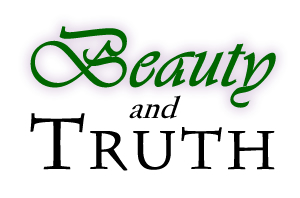Beauty and Truth 2: The Criticism Of Story
We can talk at length about how stories aren’t wrong. We can defend story choices with Scriptures about where sin really comes from (it’s not from the world, but from sinful hearts). We may point to a superhero movie or fantasy epic in which good and evil are clearly defined, true sacrifice lauded, and heroes fight to save their worlds.
 See? we exclaim, gesturing to a page or screen. This is great stuff. Look at the Gospel echoes in this! That character reminds me of goodness. That hero reminds me of Jesus.
See? we exclaim, gesturing to a page or screen. This is great stuff. Look at the Gospel echoes in this! That character reminds me of goodness. That hero reminds me of Jesus.
It’s very true. I’ve said that myself. It’s frequently said on Speculative Faith.
But … it could all come crashing down if someone raises his eyebrow and says:
If you want to be reminded of those things, why not simply read the Gospels again, or hear a sermon or read a nonfiction book about goodness or Jesus and what we should do for Him? Aren’t there more important things to do than reading and defending stories?
‘More important things’?
For me, the most recent occasion like this came during a friend’s online conversation-starter about Christians’ entertainment choices. Naturally I pitched in. Naturally I found myself in some deep discussion. One woman, very kindly and sincerely, asked this:
The fruit probably looked fine to Eve by her standards. Do you think, then, since our heart is deceitful above all things (Jer 17:9), that we should try so hard to legitimize our entertainment or are we to redeem the time, if nothing else, since entertainment activities can keep up from more important things?
Quite a fair question, and already a challenging one. I’ll try to make it even tougher:
 Christians are saved for a mission. It’s summarized by Jesus’s Great Commission (Matt. 28: 16-20). He said to go and make disciples of all nations, baptizing and teaching them. We work to spread the Gospel, organize churches, support our families, and more. Given all of those clearly defined parts of our mission, why spend time reading or defending fiction?
Christians are saved for a mission. It’s summarized by Jesus’s Great Commission (Matt. 28: 16-20). He said to go and make disciples of all nations, baptizing and teaching them. We work to spread the Gospel, organize churches, support our families, and more. Given all of those clearly defined parts of our mission, why spend time reading or defending fiction?
In response, a story defender might say something like this.
Story defender: “There’s nothing wrong with it. Biblically, you can’t say that something is sinful if some Christians can enjoy it without sinning. I can read this and be reminded about the Gospel, goodness, and more.”
Story objector: “That doesn’t address the main point. What is right about wanting to spend all this time on fiction? If you want all these things, just cut out the ‘middle man.’ If you want to be reminded of the Gospel or goodness, read the Bible. Or do something more worthwhile, like sharing your faith or helping in your church.”
Or a defender might respond like this:
Story defender: “It’s harmless entertainment. Don’t be a legalist. Attitudes like this too often give Christians a bad name. Jesus died for our freedom. That’s what I practice.”
Story objector: “Your view misses the fact that Jesus died to set us free from sin and to make all our desires be like His. Would He be happy about you spending all this time reading or defending stories instead of fulfilling the Great Commission? Would He be happy with you dismissing concerns about ‘neutral’ entertainment as ‘legalistic’? Again, there are more important things Christians should be doing besides defending fiction.”
There. I’ve made the criticism as fair and formidable as I can. Now let’s try to answer it.
Rejecting negative reasons
Notice the similarity in both those story defenses: they’re based on what a story is not.
The first says a story is not worldly or a source of real temptation, so it must be okay.
The second says enjoying a story is not legalistic or repeating other Christians’ errors.
Either one, at best, raises stories to the level of “neutral.” There’s one problem. For the Christian, nothing is neutral. You do an action out of faith, or not out of faith. Even for something “neutral” like eating questionable meat, if you doubt it’s okay, it’s wrong:
But whoever has doubts is condemned if he eats, because the eating is not from faith. For whatever does not proceed from faith is sin.
Romans 14:23
Those defenses of story are not based on a positive reason that “proceed[s] from faith.”
But if that’s true about fiction, it’s also true about everything. This afternoon I cleaned up the house. Did I do that “proceed[ing] from faith”? I loaded my dishwasher. Now I’m writing this column, which includes checking Scripture references. Am I doing this “proceed[ing] from faith”? Or not from faith?
Any challenge that we have “more important things” to do than explore what Scripture says about stories applies to all our actions. Taken to its logical conclusion, we could question any action. Why vacuum the carpets at church? Why have ambition at your workplace? Why pull weeds in the garden? Aren’t there more important things to do?
Actually, that’s one objection: that the story critic isn’t also questioning everything else.
But still, we need to discern and articulate a positive reason for why we read stories — Christian, speculative, and anything in between — and spend time defending them in our discussions and thoughts.
My suggested answer is partly hinted in the title of this series.
But I’m first curious about your answer. Consider the best objections to stories that you’ve heard, either simulated here or spoken in reality. How would you respond?









































I enjoy a good novel. In fact, I have really anticipated all of the new Christian speculative titles that are coming out soon (the next ones I plan to read are R. J. Larson’s Prophet and Homer Hickam’s Crater), but I can understand where critics of fiction are coming from. I have struggled with this issue. Is it right to read fiction? Is it a waste of time? I was talking to my girlfriend about it, and she reminded me that there is nothing inherently wrong with reading good, wholesome, edifying fiction (she’s an English education minor). “But,” she said,”you can’t get obsessed with it.” I think that’s the key issue–having a balance. Reading fiction is fine, if that’s not all you do. As long as you put God, the Bible, and soul-winning first, then there is nothing wrong with reading Christian fiction. I believe God enjoys it when we write and read stories that reflect positively on Him. He gaves us our imagination, so why shouldn’t we use it to magnify Him in story?
Wow. This is one of those arguments that will go on forever. The objector will never change their view that fiction is a waste of time, and the defender will never stop defending it as good wholesome entertainment. Time to find a new avenue of discussion, I think.
I think, though, an argument exists that decisively proves fiction is no waste of time … an argument based on the very Bible that the objector believes proves that Christians have “more important things” to do.
Is it possible that for one person it would be a waste of time (if they get nothing out of it), but for someone else it would be time well spent. The danger is assuming that how you feel about something, or what you draw for an activity, is the same thing that everyone else does as well. The fact is, everyone is different.
Doggone it, Stephen, you’re thinking again. Stop that! 🙂
I believe both creation and recreation are wired into the human soul. We’re made in the image of God, who accomplished the work of creation and established a Sabbath for rest. Some of the objections that you’ve outlined sound like the manager who’s consumed by the fear somebody might be slacking on company time, and all the while, his obsession with productivity only serves to make everyone less productive.
As a reader, I see stories as just one more way God can speak to me. Yes, we have the Bible (which, incidentally, is filled with stories), but given the evidence the Bible itself provides, there are many other ways besides Scripture that God communicates with us, up to and including talking donkeys.
As a writer, and a Christian, I see stories as a form of prayer. I can spill out my wants, needs, hopes, dreams, fears, and nightmares onto the page, and God is listening to all of it. In turn, the writing process is interspersed with long periods of me listening for inspiration, ideas, answers, and guidance.
One problem the objectors might have with fiction, is that inspiration comes from the Holy Spirit himself. Even the Prophets were compelled to write down their visions. They couldn’t help but preach when the Holy Spirit was upon them.
It’s the same way with an author. When inspiration strikes, the author has no choice. And if that inspiration comes straight from the Holy Spirit, how can the objectors complain?
I meant to address this before. I think we’d be talking about two kinds of “inspiration,” here. While Christians certainly draw on their spiritual gifts to read or write stories, that’s not the same level of “inspiration” God used to guide the human authors of Scripture. (My guess is that you didn’t even mean to imply that, though!) People often ascribe stuff to the Holy Spirit that in fact they’ve made up. If I were a fiction critic, that’s what I would say in response — especially because many fiction critics often apply the “sufficiency of Scripture” truth, but in flawed ways that ignore imagination.
One need not get into any kind of charismatic/continuationist vs. cessationist debate about it, though! All “sides” could agree, I think, that Scripture directly endorses enjoyment and glorification of God in all things. And fiction uniquely glorifies Him.
Ok, I just read a post today that totally applies to this post:
http://www.challies.com/interviews/fiction-literature-an-interview-with-russell-moore
Here is one question addressed in this post: “I wonder if you can give a few pointers on the benefits of reading fiction. I know of quite a few people who consider it a distraction at best or a sinful waste of time at worst. What benefit is there in reading contemporary novels?”
Really good post and explains why I write 🙂
I would fall back on Tolkien’s article and say that stories help us re-vision things as they really are. And I would also say that literature is an art that could glorify God just as the art of music or painting can.
I’ve always felt that stories bring truth to the heart. That’s why Jesus used parables so often.
Writing (or any art form) can be used to glorify God. When I write, my goal is to get truth across to the reader in story form. My hope and prayer is that he/she will be blessed by the story.
I want to believe that there’s something objectively real about stories, and something objectively proactive about both creating and appreciating stories and other forms of art. We have to live as real people in this world, and creating and enjoying art are two things that real people do in real life. To forbid them would be like forbidding toddlers to crawl.
That’s not enough of a justification for me, though. I want to find something more important and more real in the act of storytelling itself. Specifically, I want to find out objectively how imaginary worlds can change our real world. I’m looking forward to the rest of this series.
Wow, these are good questions. And honestly, I would have answered a story objector with a defense of what a story is not –but you’re right that that’s not enough. So thank you for nudging me to think Biblically about this issue!
I recently talked to Daddy about a similar matter (does the Bible permit reading fiction at all?). Dad pointed out that in 1 Corinthians 5:9 and Colossians 4:16, Paul mentions letters that he expected the churches to read, but these letters obviously weren’t inspired Scripture. And Ecclesiastes 12: 12 warns that there are hundreds of books out there, and studying every single one of them would be a burden. So the Bible allows for reading works other than itself.
Also, when Paul says “Whatever is true, whatever is noble, whatever is right, whatever is pure…,” the “whatever” category applies to things outside the Bible.
Moreover, a shining positive for reading fiction–or looking at a picture, listening to music, enjoying a well-thought out debate (like this one!), or watching a movie–would be to enjoy the creativity that God has given us and to exercise the imagination He has blessed us with. We can glorify Him by enjoying and using these gifts.
I’m looking forward to your next article!
Blessings,
Literaturelady
*clears throat in an annoyed way*
Sorry about all that computer lingo above my comment. I had drafted the comment in a Word document and then pasted it here. The wrong way to go, methinks.
*shamefaced smile*
Literaturelady
Just fixed it, Literaturelady.
[…] E. Stephen Burnett: I meant to address this before. I think we’d be talking about two… 11:44 am, May 10, 2012 […]